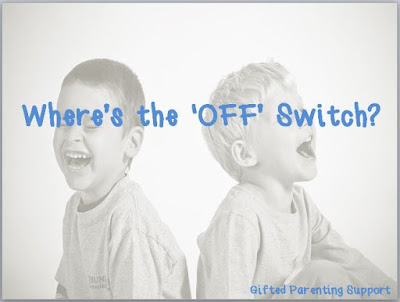Where’s the ‘OFF’ Switch?
Parenting young gifted children can be a challenge. A gifted
child brings numerous intensities into the world around them. It’s often
lamented that they do not fit into society’s notion of how children should act
or react. Parents describe them as ‘more’ in every aspect of their lives and it
can be exhausting for everyone involved. So … where is that ‘off’ switch and do
you really want to flip it?
One of the first telltale signs of giftedness is a child’s
extremely early penchant to ask questions; a lot of questions and not just
simple ones. In many gifted children, asynchronous development leads to highly
intuitive and complex questioning of practically everything. The best way to
foster a child’s giftedness is to provide them with an exceptional learning
environment in which those questions can be answered; no matter how often or
how many. As author Christine Fonseca tells us, “we must remind ourselves
that they are curious; and that’s a good thing!”
The intensity experienced by young gifted children extends
beyond their insatiable curiosity and unfortunately can affect their
relationships with adults as well as age-peers. The fact that they are labeled
as gifted cannot be an excuse for bad behavior. One of the most important
lessons we need to teach our children is how to optimize interpersonal
relationships in a way that benefits all involved.
A characteristic such as bossiness is viewed as highly
unfavorable; especially when directed towards teachers or other adults. Young
children who are highly intelligent may not yet understand the nuance between
being bossy and the qualities associated with leadership. A patient
and well-reasoned explanation of the differences will work better than
criticism of their behavior.
Gifted children often have a wide breadth of knowledge
leading them to be criticized as a ‘know-it-all’. It’s important to guide
them to know how to temper their approach to those around
them. Gifted kids need to harness their abilities and learn to
appreciate others’ viewpoints even when they disagree.
Navigating age-peer relationships with kids who don’t
understand their intensity can be a source of angst for a gifted child. To
nurture the qualities necessary to succeed in relationships, adults
should explore the concepts of empathy, high expectations, emotional
intensity and social justice with the child. Discuss emotional intensity
in a positive light. Don’t disparage the child’s feelings; respect them.
In their book BLOOM, authors Dr. Lynne Kenney and Wendy
Young compare intense children to flowers in a garden. Consider the quote below
when thinking about your gifted child.
Sleep is often a major concern for parents of gifted
children. Some research suggests that gifted children need less sleep; but
they still need sleep and so do their parents! As with most advice on
parenting, it rarely works for gifted kids. It is usually a case of trial and
error to find what works best for each child. And sometimes; nothing works.
If and when lack of sleep begins to affect everyday life … an
inability to complete school assignments, being habitually late to school,
displaying inappropriate emotional responses … a parent may need to consult a
professional who is familiar
with giftedness for
help. Otherwise, the risk of misdiagnosis can lead to inappropriate
interventions.
It’s important not to assume that young gifted children
understand the nature of their giftedness. It’s more than just being
smart. Talk to your child about what it means to be gifted. Explore ways
to co-exist in a world that doesn’t always appreciate someone who performs
outside the box. Emphasize to them that being gifted is not being better than
someone else; it’s simply about being different. It is experiencing life in a
way that doesn’t always conform to social norms.
Gifted kids do grow up. Consider hitting the ‘play’ button
more often than looking for the ‘off’ switch. You will be building memories together
to last the rest of your lives! And about that good night’s sleep that eludes parents
of young gifted children? They eventually get it.
Note: Portions of this post were previously published at the Global #gtchat Powered by TAGT Blog.
Resources:



I love that quote and hadn't come across the book - thank you for sharing. I like to think I'm hitting 'play' more than looking for 'off' these days, but themetaphor has made me realise I'm probably neglecting the roses in my garden. 😄
ReplyDeleteVery nice article. Thanks for sharing it.
ReplyDeleteAwesome share! Lessons learned in the home by parents are indeed becoming increasingly crucial in today’s world.
ReplyDelete